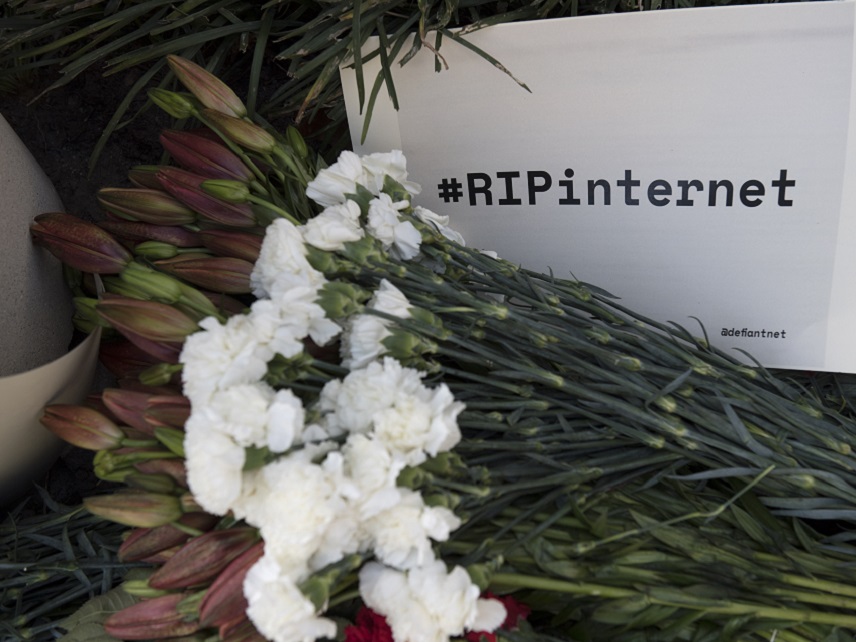One Year Ago Today, the FCC Killed the Internet
But if you're reading this, you know that's not true.

One year ago today, the Federal Communications Commission killed the internet.
Except the internet didn't really die—quite the opposite, in fact—when the FCC voted down party lines to end the series of regulations known as "net neutrality."
Despite the overwrought warnings and fearful pleas of advocates for greater government regulation of the world wide web, the past 12 months have not seen a rise in evil cable companies slowing consumers' internet connections or the creation of an online dystopia where only those who can plop down fat stacks of cash to pay for premium connections can have fun.
Everything you love about the internet will be ruined, we were told. "The illegal music you downloaded on Napster or Kazaa. The legal music you've streamed on Spotify. The countless hours of pornography you've watched. The movies and TV shows you've binged on Netflix and Amazon and Hulu. The dating site that helped you find the person you're now married to. All of these things are thanks to net neutrality." Except all those things existed before net neutrality was implemented in 2015 and—shocker!—it all still exists today (well not Kazaa, but no one misses Kazaa).
It was going to be very bad. "Try this scenario on for size: You wake up, reach for your phone, and head to your favorite news site to check the headlines. But instead of the latest news, you see a message from your cellphone carrier: 'This site is not available. Please upgrade to our deluxe package to access it.'"
Has that happened to you in the past 12 months?
The net neutrality fear-mongering is worth remembering because of how widespread, mainstream, and self-assured it was. The front page of CNN.com called the FCC's vote "The end of the internet as we know it," but I just checked and CNN.com is still there, somehow. The same is true of The New York Times' website, where you can still find an op-ed declaring that repealing net neutrality would be the "final pillow in [the internet's] face."
Bunk. All of it. Internet speeds have increased by 40 percent during 2018, according to a recent report by Recode.
It could be that corporate mischief is being kept at bay by the threat of returning federal regulation. "Any egregious violations of the principles of net neutrality by broadband providers would provide ammunition to advocates who want the old rules restored," opines Wired's Klint Finley today in a detailed review of what's changed and what hasn't (mostly hasn't) in the year since the end of net neutrality.
But it's more likely, I think, that ISPs have pretty good incentives to keep their consumers satisfied—and that means not shutting off their Netflix—in a market where longstanding walls that limited competition are coming down. With wireless speeds now able to compete with traditional internet connections, cable companies like Comcast have even more of a reason not to slow down service or "throttle" websites. If I can't watch Hulu on my wifi-connected TV, I'll just stream it from my phone and think harder about cutting the cord.
That's why net neutrality was always, as FCC chairman Ajit Pai told Reason pre-repeal, "a solution that won't work to a problem that doesn't exist."
Or, as Reason's Nick Gillespie spelled out last year on the eve of the net neutrality repeal.
First and foremost, the repeal simply returns the internet back to pre-2015 rules where there were absolutely no systematic issues related to throttling and blocking of sites (and no, ISPs weren't to blame for Netflix quality issues in 2013). As Pai stressed in an exclusive interview with Reason last week, one major impact of net neutrality regs was a historic decline in investment in internet infrastructure, which would ultimately make things worse for all users. Why bother building out more capacity if there's a strong likelihood that the government will effectively nationalize your pipes? Despite fears, the fact is that in the run-up to government regulation, both the average speed and number of internet connections (especially mobile) continued to climb and the percentage of Americans without "advanced telecommunications capability" dropped from 20 percent to 10 percent between 2012 and 2014, according to the FCC (see table 7 in full report). Nobody likes paying for the internet or for cell service, but the fact is that services have been getting better and options have been growing for most people.
If there's a threat to the future of the internet in 2018, it's not from the demise of net neutrality but from the ongoing efforts of politicians to control technology that they don't understand.
From the Republican-led efforts to use antitrust laws to target Google and Facebook for being insufficiently conservative-friendly to the Democrat-led efforts to regulate digital platforms in the name of stopping election-meddling Russian bots and fake news, Congress is scheming up all sorts of ways to do far worse things than anything cable companies have done in the aftermath of net neutrality's demise. And don't forget the entirely predictable anti-freedom consequences of the passage of the Fight Online Sex Trafficking Act of 2017 (FOSTA), which nominally cracks down on sex trafficking but practically pushes sex workers into more dangerous situations both online and in the real world.
The next time you hear someone wailing about the need for new laws to save the internet, remember how stupidly wrong all the predictions about net neutrality turned out. The internet is fine. Just let it be free.


Show Comments (48)